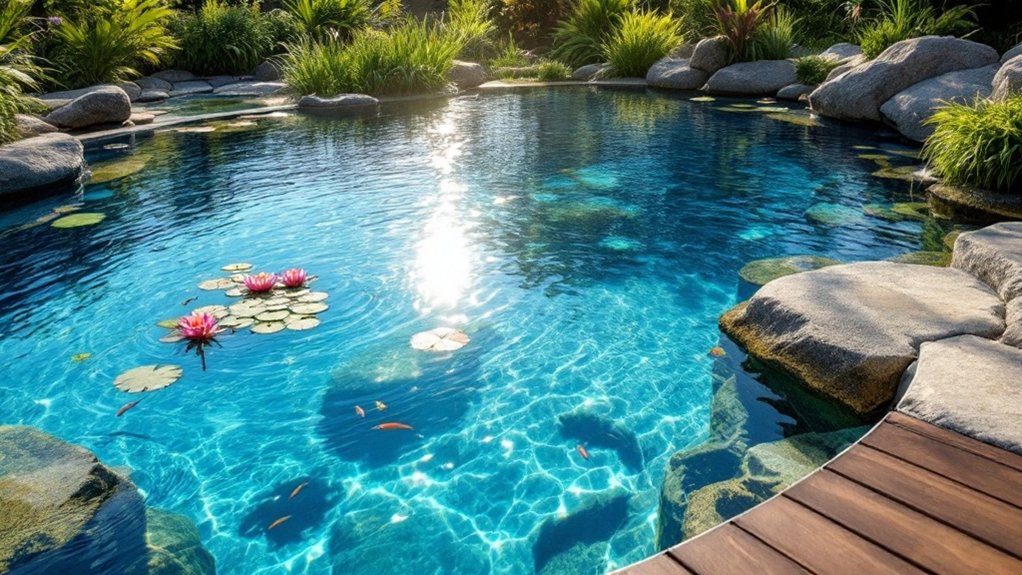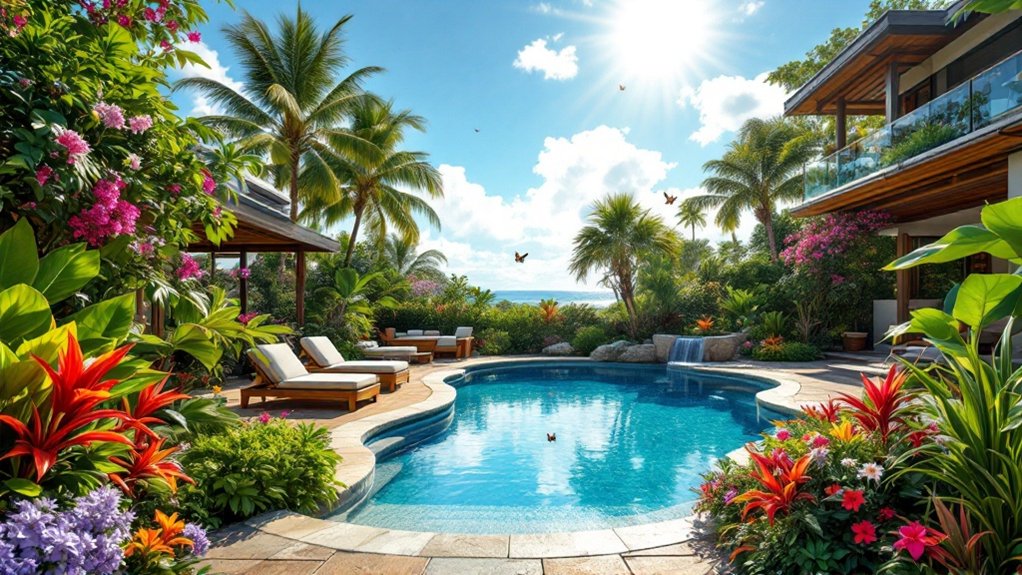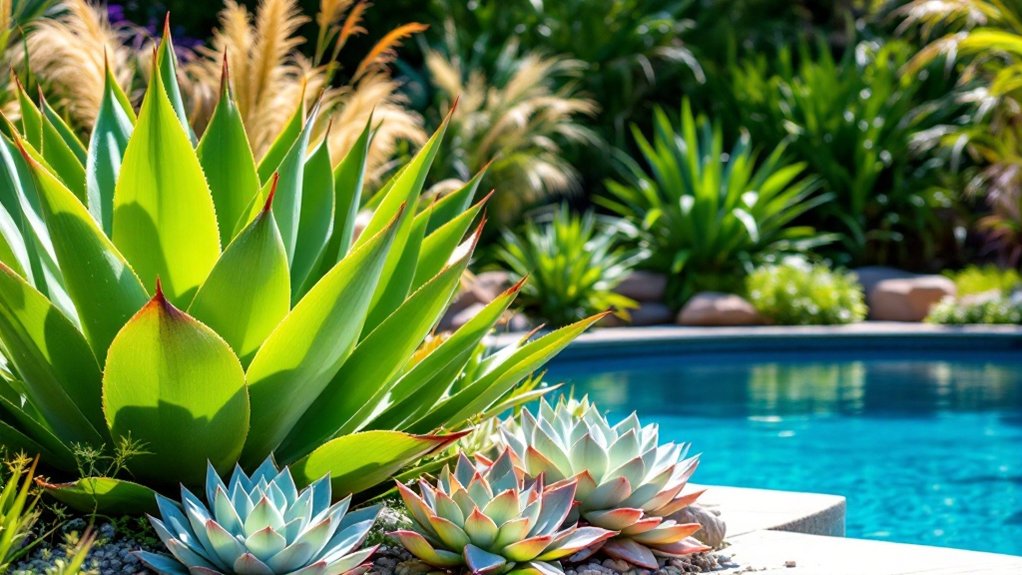Natural pools are innovative swimming environments designed to replicate the essence of natural bodies of water. They utilize biological filtration instead of harsh chemicals, promoting a harmonious relationship with nature. This approach not only enhances the aesthetic value of outdoor spaces but also provides several health benefits. As interest in eco-friendly solutions grows, understanding the components and advantages of natural pools becomes increasingly relevant. What unique features set them apart from traditional pools?
Understanding Natural Pools
Although many people are familiar with traditional swimming pools, natural pools offer a distinct alternative that emphasizes ecological balance and aesthetic appeal. These pools are designed to mimic natural bodies of water, incorporating elements such as rocks, plants, and gravel to create a harmonious environment. Unlike conventional swimming pools that rely on chemicals for sanitation, natural pools utilize biological filtration systems, which promote water clarity and health through natural processes. This design encourages biodiversity, attracting various species of flora and fauna. In addition, natural pools provide a unique swimming experience, allowing individuals to connect more closely with nature. The aesthetic beauty of a natural pool can enhance outdoor spaces, making them a delightful addition to gardens and landscapes while promoting environmental sustainability.
The Components of a Natural Pool
Natural pools consist of several key components that work together to create a self-sustaining ecosystem. The primary areas include the swimming zone, where users can enjoy the water, and the regeneration zone, which is vital for water purification. This regeneration zone houses aquatic plants and beneficial microorganisms that contribute to the natural filtration process. Additionally, edge plants help stabilize the pool’s banks and provide habitat for wildlife. The overall design often incorporates rocks and gravel to enhance aesthetics while supporting the ecosystem. Proper water circulation is also essential, typically achieved through pumps or natural currents. Together, these components guarantee that natural pools maintain water quality and provide a harmonious environment for both humans and aquatic life.
How Natural Filtration Works
Effective natural filtration in pools relies on a combination of biological and physical processes that work in harmony to maintain water clarity and quality. The system typically incorporates aquatic plants, which absorb nutrients and provide shelter for beneficial microorganisms. These microorganisms play an essential role in breaking down organic debris and harmful substances. Additionally, gravel and sand layers act as physical filters, trapping particles and preventing them from circulating in the water. The circulation of water through these filters enhances oxygenation, further supporting microbial activity. This holistic approach minimizes the need for chemical treatments, promoting a more sustainable and eco-friendly swimming environment. Ultimately, natural filtration systems create a balanced ecosystem that keeps water clean and safe for users.
The Aesthetic Appeal of Natural Pools
Natural pools are celebrated for their eco-friendly design elements that harmonize with the surrounding landscape. This integration not only enhances visual appeal but also promotes environmental sustainability. As a result, these pools create serene and inviting outdoor spaces that resonate with nature.
Eco-Friendly Design Elements
Although many pools prioritize functionality, the aesthetic appeal of eco-friendly design elements in natural pools captivates homeowners and landscape enthusiasts alike. These pools often feature natural materials such as stone and wood, which blend seamlessly with their surroundings. The incorporation of native plants not only enhances beauty but also supports local ecosystems, creating vibrant, lush environments. Natural filtration systems, utilizing gravel and aquatic plants, contribute to the pool’s visual allure while promoting sustainability. Additionally, the use of natural shapes and contours mimics the organic forms found in nature, adding to the serene atmosphere. Overall, the eco-friendly design elements of natural pools provide an enchanting balance between beauty and environmental consciousness, making them a sought-after choice for eco-minded individuals.
Harmonious Landscape Integration
When integrated thoughtfully into a landscape, natural pools enhance their surroundings, creating a seamless shift between built and natural environments. These pools often mimic the look and feel of natural bodies of water, featuring organic shapes and surrounding flora that blend with the existing landscape. By using local materials and native plants, natural pools can complement the architecture of nearby structures while promoting biodiversity. Their aesthetic appeal is further enhanced by the gentle sounds of flowing water and the vibrant life that thrives within them. This integration not only elevates the visual experience but also fosters a sense of tranquility. Ultimately, natural pools serve as a stunning focal point, enriching outdoor spaces and promoting a deeper connection to nature.
Health Benefits of Swimming in Natural Water
Swimming in natural water offers numerous health benefits, including enhanced immune function and stress reduction. The exposure to nature can promote overall well-being, while the minerals found in natural bodies of water may provide advantages for skin health. These factors contribute to a holistic approach to physical and mental wellness.
Enhanced Immune Function
While many people recognize the physical benefits of swimming in natural water, fewer are aware of its potential to enhance immune function. Exposure to the diverse microorganisms present in natural pools can stimulate the immune system, promoting a more robust response to pathogens. Swimming in these environments may help increase the production of white blood cells, which play an essential role in defending the body against infections. Additionally, the natural minerals and elements found in the water often contribute to improved skin health, which is important for maintaining barrier defenses. Overall, engaging with natural water can lead to a healthier immune system, providing individuals with better resilience against illnesses and enhancing overall well-being.
Stress Reduction Effects
The serenity of natural water environments offers profound stress reduction effects that can greatly improve mental well-being. Swimming in natural pools immerses individuals in tranquil settings, often surrounded by greenery and wildlife, which fosters a sense of peace. The rhythmic movements of swimming promote relaxation, allowing the mind to release tension. Additionally, exposure to natural water has been linked to increased feelings of happiness and contentment, as it encourages mindfulness and a connection to nature. This natural setting can serve as a sanctuary from daily stressors, enabling individuals to recharge emotionally. Overall, engaging in swimming within these environments not only provides physical benefits but also plays an essential role in enhancing psychological health through effective stress management.
Natural Skin Benefits
Natural water environments provide unique skin benefits that differentiate them from traditional pools. Unlike chlorinated pools, natural pools often contain minerals and organic compounds that can be gentler on the skin. Substances such as algae and aquatic plants may promote skin hydration and improve elasticity. Additionally, the absence of harsh chemicals reduces the risk of skin irritation and allergic reactions, making natural waters a soothing option for sensitive skin. The natural ecosystem can also support the skin’s microbiome, potentially enhancing its protective barrier. Moreover, swimming in these environments encourages exposure to sunlight, which aids in vitamin D production, essential for skin health. Overall, the natural composition of these water sources offers a revitalizing alternative with various skin-enhancing properties.
Environmental Impact of Natural Pools
Although many traditional swimming pools require significant chemical treatments and energy consumption, natural pools offer an eco-friendly alternative that minimizes environmental harm. Utilizing a biological filtration system, these pools rely on plants and natural processes to maintain water clarity and balance, reducing reliance on harsh chemicals. This approach not only protects local ecosystems but also conserves water, as natural pools often use rainwater collection systems. In addition, their design promotes biodiversity, providing habitats for various aquatic plants and wildlife. The absence of chlorine and other chemicals further contributes to healthier surrounding soil and water systems. Overall, natural pools represent a sustainable choice, aligning recreational enjoyment with environmental stewardship, and reducing the ecological footprint typically associated with conventional swimming pools.
Maintenance and Care for Natural Pools
Proper maintenance and care are essential for guaranteeing the longevity and health of natural pools. Regular inspections for debris, such as leaves and twigs, help maintain water clarity and prevent algae growth. It is vital to monitor water levels and maintain appropriate filtration systems to support the natural ecosystem. Routine checks on the aquatic plants guarantee they are healthy and thriving, as they contribute to water quality and habitat balance. Additionally, maintaining the surrounding landscape can prevent soil erosion and contamination. Seasonal maintenance may include adjusting plant life, cleaning filters, and checking for any structural issues. By adhering to these practices, homeowners can enjoy the beauty and benefits of natural pools while promoting a sustainable aquatic environment.
Cost Considerations for Installing a Natural Pool
When considering the installation of a natural pool, potential owners must evaluate the initial costs associated with construction. Additionally, ongoing maintenance expenses can impact long-term affordability and sustainability. A thorough assessment of both short-term investments and long-term value is essential for informed decision-making.
Initial Installation Costs
Installing a natural pool involves several cost considerations that potential owners should carefully evaluate. The initial investment for a natural pool can vary considerably based on design, size, and the materials used. Site preparation, which may include excavation and landscaping, is often a substantial part of the total cost. Additionally, the installation of filtration systems and aquatic plants can further increase expenses. Homeowners must also account for any necessary permits or professional consultations, which can add to the overall budget. While natural pools typically have higher upfront costs compared to traditional pools, their eco-friendly benefits and lower long-term maintenance expenses often make them an attractive option for those looking to enhance their outdoor space sustainably.
Ongoing Maintenance Expenses
Ongoing maintenance expenses for natural pools can be considerably lower than those associated with traditional swimming pools. Natural pools utilize biological filtration systems that rely on plants and beneficial microorganisms, reducing the need for chemical treatments. This eco-friendly approach minimizes costs related to pool chemicals, which can accumulate over time. Additionally, the energy requirements for natural pools are often less, as they typically use smaller pumps and less energy-intensive systems. Regular maintenance tasks, such as plant care and occasional debris removal, are generally straightforward and can often be performed by the owner, further reducing expenses. Overall, the lower reliance on chemicals and energy contributes to a more sustainable and cost-effective maintenance routine for natural pool owners.
Long-Term Value Assessment
Investing in a natural pool offers a unique blend of aesthetic appeal and environmental sustainability, making it a compelling choice for homeowners. Regarding long-term value assessment, the initial installation cost may be higher than traditional pools; however, the savings on chemical treatments and lower energy costs can offset these expenses over time. Natural pools often enhance property value, attracting eco-conscious buyers and providing a serene outdoor space. Additionally, they require less maintenance, reducing long-term upkeep costs. With the benefits of improved biodiversity and water purification, natural pools not only contribute to a healthier environment but also offer a lasting investment that aligns with sustainable living principles, making them a financially sound option in the long run.
Comparing Natural Pools to Traditional Pools
While both natural pools and traditional pools offer unique experiences, their fundamental differences greatly influence user preferences and environmental impact. Traditional pools rely on chemical treatments to maintain water clarity and hygiene, which can pose environmental risks and contribute to health concerns. In contrast, natural pools utilize biological filtration systems, promoting a self-sustaining ecosystem that minimizes chemical use and enhances water quality. Additionally, natural pools often integrate seamlessly into landscapes, providing aesthetic and ecological benefits, such as attracting wildlife and supporting local flora. Users may prefer traditional pools for their ease of maintenance and immediate clarity, while those valuing sustainability and a natural ambiance may gravitate towards natural pools. Ultimately, the choice reflects individual values and lifestyle priorities.
Designing Your Own Natural Pool
How can one create a natural pool that harmonizes with their environment? Designing a natural pool begins with selecting a suitable location that considers sunlight, shade, and existing flora. The layout typically includes a swimming area and a regeneration zone filled with aquatic plants that filter water naturally. Choosing local, native plants not only enhances aesthetics but also supports local wildlife. The pool’s depth should vary to create diverse habitats, while natural materials like stone and gravel can be used to construct edges and pathways. Incorporating a biofilter system guarantees water remains clean without chemicals. Finally, it is essential to integrate the pool seamlessly into the surrounding landscape, allowing it to feel like a natural extension of the environment.
Frequently Asked Questions
How Long Does It Take to Build a Natural Pool?
Building a natural pool typically takes between two to six months, depending on various factors such as size, design complexity, and weather conditions. Proper planning and skilled labor can expedite the construction process considerably.
Can Natural Pools Attract Wildlife Like Frogs and Birds?
Natural pools can indeed attract wildlife, including frogs and birds. Their eco-friendly design creates a natural habitat, encouraging biodiversity. This feature enhances the pool’s ecosystem, promoting a balanced environment for various species to thrive.
Are Natural Pools Safe for Children?
The safety of natural pools for children depends on various factors, including design, supervision, and maintenance. Properly constructed pools can provide a safe environment, while ensuring regular monitoring can help mitigate potential risks for young swimmers.
What Is the Lifespan of a Natural Pool?
The lifespan of a natural pool typically ranges from 15 to 25 years, depending on factors such as maintenance, construction materials, and environmental conditions. Regular care can greatly extend its longevity and overall functionality.
Can I Convert a Traditional Pool to a Natural Pool?
Converting a traditional pool to a natural pool is feasible, but it requires significant modifications. This process involves removing chemicals, adding biological filtration systems, and incorporating aquatic plants to create a self-sustaining ecosystem.
Conclusion
To sum up, natural pools offer an eco-friendly alternative to traditional swimming areas, combining aesthetic beauty with environmental benefits. Their unique design promotes biodiversity while providing swimmers with a chemical-free experience that enhances well-being. With proper maintenance and thoughtful design, these pools can serve as tranquil retreats that harmonize with nature, making them an appealing choice for those seeking relaxation and a deeper connection to the natural world. Ultimately, natural pools represent a sustainable choice for recreational enjoyment.




